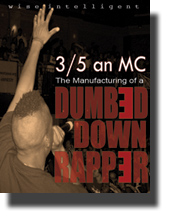Wise Intelligent discusses 'The Manufacturing of a Dumbed Down Rapper'
By FinalCall.com News | Last updated: Jun 12, 2011 - 10:07:34 PMWhat's your opinion on this article?

|
FinalCall.com (FC:) Many people refer to the “Golden Age” of Hip Hop as an era when there were conscious songs permeating the airwaves. It is generally believed that the era is long gone and it'll never be like that again. Perhaps we will never get back to a time where socially and politically conscious artists dominate the airwaves. In a time when Hip Hop artists still impact and shape minds, what are your thoughts?
Wise Intelligent (WI:) I think it's just a gross misconception of Hip Hop from what Hip Hop is in a broader sense. I think that we're allowing mainstream mediums through which corporations propagate a particular brand of Hip Hop. We're allowing that medium to interpret for us what Hip Hop is or isn't. I think that's where we fall short of understanding.

|
It's a plethora of MCs young and old who are still on the front lines of social and political relevant conscious music; it's just that mainstream media is not allowing a particular brand of Hip Hop because they only want to propagate one ideal. And we have this ideal that those ten MC's that we hear in every rotation in mainstream mediums are what Hip Hop is. So if it's not in the mainstream it's apparently not in the bloodstream for a lot of people because they are allowing mainstream media to dictate what Hip Hop is or isn't for them. But we're still right here. MC's are still touring, still putting out records and a lot of people don't want to get back to that era especially corporate people and for social, economic and political reasons also. Basically, more so political reasons. So I say that it's a myth that we are not going to get back to that era. For me it's not a matter of getting back to that era. It's a matter of becoming aware of the fact that that era hasn't left us. It's still here.
FC: When you were making songs in 1990 on the album “Holy Intellect” and then in 1991 with “Pure Poverty” as a follow-up, there was an ideological underpinning acting as a catalyst for your lyrical content. What was it primarily that caused you to inject that kind of information into your songs? Books, speeches, the general atmosphere in the community, what was it?
WI: It was a conglomerate of a lot of things that you listed. The circumstances, you know living in a state of poverty, living in an environment where poverty is concentrated into small areas and the environment is over populated with poor people. Growing up in an environment where the High School had a 71 percent and still has a 71 percent student poverty rate. These things exacerbate problems and small problems become major problems in such an environment. Then you have the influx of drugs, guns, things of that nature and it just gets blown out of proportion. So that was one influence in my view but really what oriented me and basically gave me the ability to interpret myself in that struggle differently for a lot of us at the time was the Supreme Wisdom.
You know the 120 Lessons as we had come to call the Supreme Wisdom—it actually gave us focus. It caused me to study and made me think more critically. It made me not take things on face value. It made me study not just myself but my surroundings, my environment. I learned that to understand yourself is to understand others. You can't understand anyone else if you don't understand yourself. You have to have an understanding of yourself first and foremost. It's just like before you can love someone else, you have to be able to love yourself. And love for us is an elevation of understanding, so understanding of others is almost impossible if you don't have an understanding of who and what you are. The Supreme Wisdom kind of put me on that path of study of research, of not taking things on face value, of rethinking, relearning, and unlearning. That basically was the underpinning of our approach to Hip Hop.
FC: From what you are saying, the motivation wasn't solely to get money. So what was the main motivation?
WI: It was a lot of things but for the most part it was a love for music, Black music in general. Whether it was a soul singer, a blues musician or a jazz musician, first and foremost is the love for the music; love of Black music.
FC: What are some of the primary influences of Black music you would say that really guided you?
WI: There's many Blues artists, Howlin' Wolf, Josh Swank, we can go back to Muddy Waters. Of course there's Billy Holiday and just moving right up through the years, Marvin Gaye, Isaac Hayes, Curtis Mayfield.
FC: More soulful sounds definitely … I think back on that … there's definitely a soulful sound in your expression.
WI: Also it was a lot of reggae artists like eek A Mouse, Yellowman, just all over the Black music spectrum as far and as wide as it stretches I was into everything. As far as money, was money a motivation? Yes. Money is always a motivation. We didn't feel like our subject matter would block us and stop us from getting money and it didn't. It didn't stop Public Enemy from making money and selling millions of records. That was the difference.
Today it's like people would be like ‘that's career suicide for you to say something like that in a record.' Whereas when we were coming up, it wasn't career suicide because the number one rap in the medium was socially and politically conscious music. So we had KRS-One, Arrested Development put their record out and their record sold four million records. Public Enemy sold millions of records. It wasn't that conscious rap wasn't selling. It's just they wanted to stop propagating that particular brand of Hip Hop for reasons specified elsewhere like in my upcoming book.
FC: Tell us a little bit about the book.
WI: It's called ‘Three-fifths an MC: The Manufacturing of a Dumbed Down Rapper.” And the book goes in on how Hip Hop got this way. How did we get here and why are we here. I don't want to give away the whole book but the bare bones of the book is basically dealing with how the mainstream MC is not a self-made MC. The environment that he's embedded in is contributing to what he delivers.
FC: What motivated you to write a book like that? What do you want the person who picks it up and reads it to come away with?
WI: I want them to get an understanding of what Hip Hop is and what Hip Hop isn't. You know from a perspective from all of the debate and discussion about Hip Hop being responsible for prison culture and gang culture. Every time they talk about Hip Hop and the mainstream they're connecting Hip Hop to random acts of violence, negativity and things of that nature. What I want people to get from a book is that Hip Hop didn't cause these problems. It was gang banging and drug dealing before 1976. These things were occurring long before Hip Hop. So we really need to get to the root causes of these things.
I think that Hip Hop is a scapegoat, it's a soft target to deflect blame off of the real cause of the social ills that we face on a daily basis. So the book goes into those social ills and defines them. Like the prison culture, I go into that and I show how that came to be. I show how the gang banging and drug dealing came to be. I show how the Black community ended up in this dilapidated state in so many cities in the United States so Hip Hop didn't do this. And that's what I'm saying we need to stop blaming ourselves for what others have done and have done to us.
(Follow Wise Intelligent on Twitter @WiseIntelligent. His most recent release: “Wise Intelligent Iz The UnConKable Djezuz Djonez” is available through iTunes. For more information regarding appearances and other outreach, go to http://www.wiseintelligent.com.)
INSIDE STORIES AND REVIEWS
-
-
About Harriett ... and the Negro Hollywood Road Show
By Rabiah Muhammad, Guest Columnist » Full Story -
Skepticism greets Jay-Z, NFL talk of inspiring change
By Bryan 18X Crawford and Richard B. Muhammad The Final Call Newspaper @TheFinalCall » Full Story -
The painful problem of Black girls and suicide
By Charlene Muhammad -National Correspondent- » Full Story -
Exploitation of Innocence - Report: Perceptions, policies hurting Black girls
By Charlene Muhammad -National Correspondent- » Full Story -
Big Ballin: Big ideas fuel a father’s Big Baller Brand and brash business sense
By Bryan Crawford -Contributing Writer- » Full Story






 Click Here Stay Connected!
Click Here Stay Connected!








